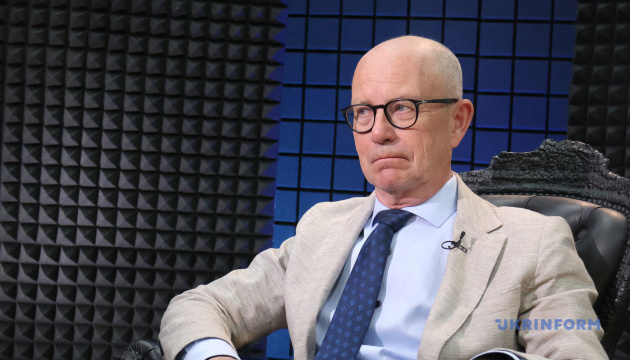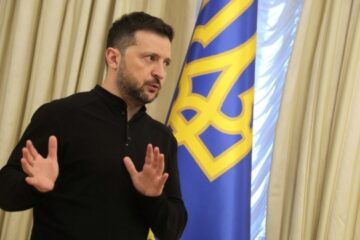Recently, Denmark, a reliable and long-standing friend of Ukraine, announced another package of military aid to Ukraine worth almost $1 billion, and on June 25, President of Ukraine Volodymyr Zelensky and Prime Minister of Denmark Mette Frederiksen agreed on joint Ukrainian-Danish production of drones and missiles. The “Danish model” of investments in the Ukrainian military-industrial complex has proven effective, while Denmark itself continues to transform its own armed forces in view of the new challenges facing the country and Europe as a whole.
Danish Ambassador to Ukraine Ole Egberg Mikkelson sat down for an interview with Ukrinform, explaining the specifics of government assistance, including in recovery issues, separately touching on countering the Russian shadow fleet and the threat Russia poses to Europe. Considering that Denmark will assume the presidency of the Council of the EU on July 1, 2025, the ambassador also spoke in detail about the priorities within the framework of this work, including in the context of Ukraine’s European integration aspirations.
[embedded content]
WE ARE DOING THREE THINGS: WEAPONS, WEAPONS, AND WEAPONS
– Just recently, Denmark announced a new aid package for Ukraine worth nearly a billion dollars. What are the key areas of this assistance?
– If you look at what Denmark is doing in Ukraine in terms of support, I’m always saying that we’re doing three things: weapons, weapons, and weapons. Of course, that’s an exaggeration as we are doing other things, but if you look at the total amount of Danish support since the full-scale Russian aggression, as of today, it’s almost EUR 10 billion. If you look at the content in monetary terms, 90 percent is weapons and defense equipment, and this will remain the same in the next phase of our support, and this is for a very simple reason because without weapons, without defense equipment, Ukraine will not be able to survive as free and sovereign nation.
So making it possible for Ukraine to defend itself is of paramount importance. And so, from the very beginning, we’ve had this approach that the most important thing is weapons, and in the beginning, we donated what we had in our own stockpiles. Remember that we donated all our artillery, the Ceasar howitzers were donated. We have empty some of our stockpiles as we don’t have any more artillery pieces.
Now, we’re using what we call the Danish model for defense procurement and defense iterations, so we we finance the acquisition of defense equipment directly from Ukrainian producers. And this has turned out to be a very, very efficient way of supporting Ukraine. It’s much faster because your producers have a lot of spare capacity they can skale up if the money is there, and this is what we’re doing.
The Danish model for defense equipment has proven to be very efficient, and it’s not only Danish money that is coming through the Danish model. Now, we have also been entrusted by the European Union to spend some of the money from the windfall profits off the seized Russian assets that goes into the Danish model, and our Swedish, Norwegian, Canadian and Irish friends have also decided to use this model.
And this, I think, is good for a number of reasons. First of all, because it’s bigger, it’s more efficient. It’s cheaper, but it’s also good for the Ukrainian economy because that creates job, creates activity in Ukraine, and this is also what is needed.
So we are doing a lot when it comes to weapons and defense equipment, but we’re also doing other things. Many Ukrainians are aware that Denmark has adopted the city and the province of Mykolaiv in the south for reconstruction and recovery. This happened back in 2022 at a time when things were very, very difficult in Mykolaiv as the Russians were at the gates of the city.
It was decided upon the request of President Volodymyr Zelensky that Denmark should assume the patronage, even though we didn’t know how to do it because we had not done this before. Since then, we have worked intensively with local and regional authorities, and Mykolaiv is now stabilized. Now, people are not leaving the city, even though it’s close to the front line.
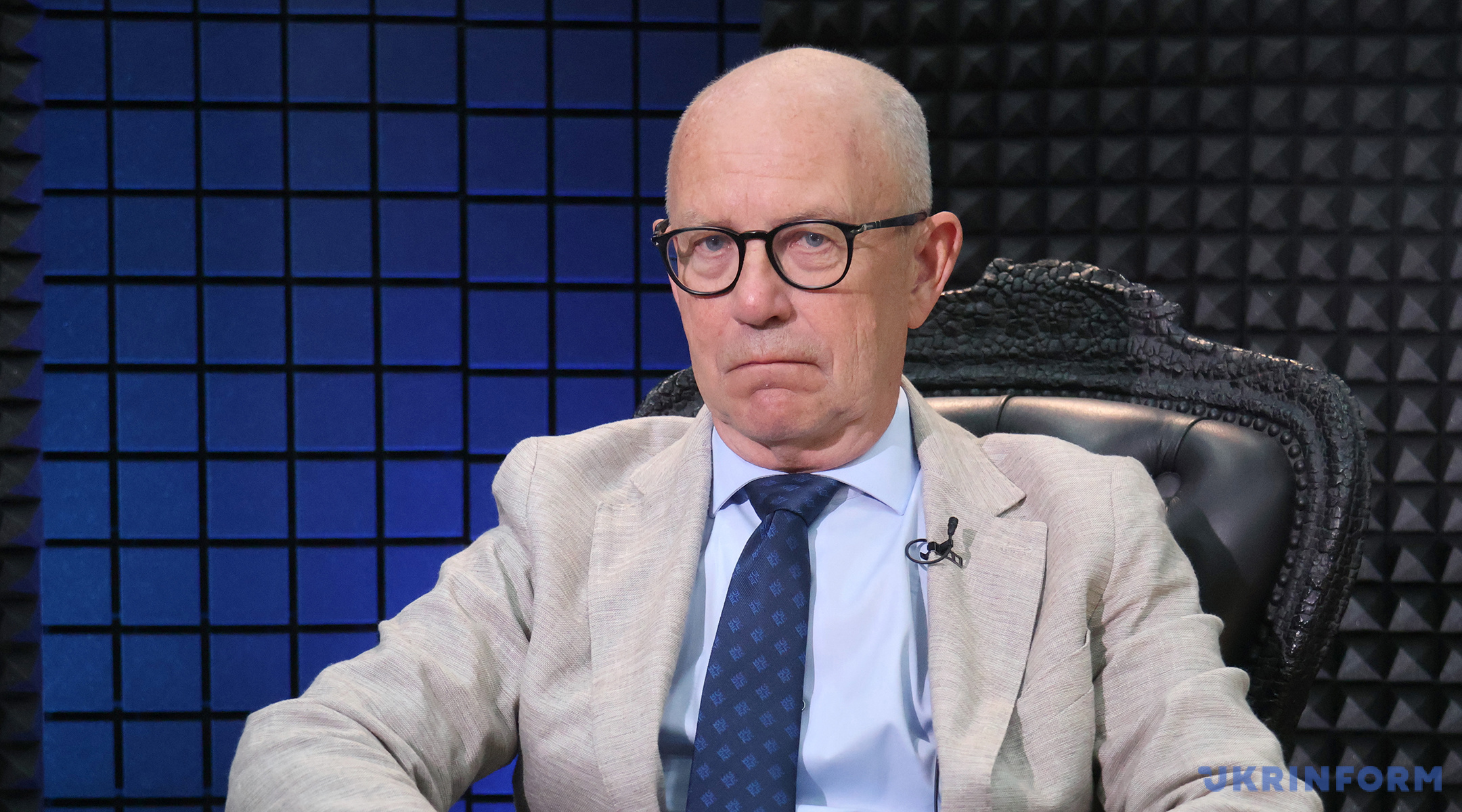
THERE IS NO UKRAINE FATIGUE IN DENMARK
We’re trying to bring the private sector enterprises back in operation because we know that the biggest wish that Ukrainians have is to be able to earn their own money to finance reconstruction. Of course, you will need help, but the main thing is to create jobs and opportunities even in frontline areas such as Mykolaiv.
So these are probably the two flagships I would point out but we also do other things, and one that is quite important is that the Danish support is not only state to state, it’s also people to people. Just on Saturday, I was in Bucha to be present on the occasion of handing over vehicles for the territorial defense, so Danish volunteers had raised money, bought those vehicles, and drove them here, handing them over to the military, and this is a sign that that the Danish support is not only state to state, it’s just as much driven by ordinary Danes who want to do something for Ukraine.
And there’s no Ukraine fatigue in Denmark. The vehicles keep coming, volunteers keep coming. So, for me as Denmark’s Ambassador, it’s very good to see that this is something that unites all Danes, that they are willing to continue even after more than three years. Some people wonder why are the Danes so supportive? How come Denmark, a country so far away where we speak different languages, we even have different alphabets, where we are in many ways different, but on one particular issue, we are on the same page, and that’s on values. Just as Ukrainians. They cherish democracy, freedom, liberty, human rights, and they want to live as a free, sovereign nation.
The Danes have realized that your freedom is our freedom. If Ukraine is going to lose its freedom, we’re going to lose ours as well. So Denmark is behind Ukraine, and I’m sure the next package that you refer to will have more or less the same content as we have seen over the last three years.
UKRAINE CONTRIBUTES A LOT TO EUROPE’S SECURITY
– There’s a lot to dissect in your extensive answer on the areas of your assistance to Ukraine. Let’s talk about the security agreement that’s been signed between our two countries. It’s a unique example of security cooperation, and I do understand there’s a two-way street of a kind. There may be benefits for both countries from that security cooperation. Could you tell us a little bit of the benefits that Denmark might get or is already getting from that Corporation? Maybe the combat experience of the Ukrainian Army, some defense developments regarding new equipment?
– Some people are saying that security assistance for Ukraine is a one-way street, that we only provide, but that’s not correct. Ukraine is also net contributed to European and our security because a strong, united and well-armed Ukraine is also in our interest. That’s something that will benefit our security as well. And one thing that is happening already is that we are learning from the experience Ukraine has gained on the battlefield, but also in many civilian fields.
You have been very, very good at adapting to wartime conditions, for instance, your energy sector, despite the Russian attacks. You are able to have electricity in the sockets and this is not something that you can take for granted. In many, many areas, Denmark – and not only Denmark but many other European nations – can actually benefit from the unique Ukrainian experience. What we should always bear in mind, that our security is closely linked to Ukraine’s security. Again, if you’re not safe, we’re not safe, and we need to be safe together. I think that’s the essence of our partnership.
A LOT OF WHAT’S GOING ON WITHIN THE DANISH MODEL IS NOT FOR PUBLIC CONSUMPTION
– I wanted to dwell a little more on the Danish model that’s indeed proven so successful that this name became colloquial. Every country, investing directly in Ukraine’s defense industry, refers to it as the Danish model. Can you point out any success stories along this line that inspires the country to invest more or focus on some particular, most promising areas?
– I think that the real eye-opener was the Ukrainian-produced Bohdana howitzers, and this is out in the open. This is something that I can say on air, because much of what is happening within the Danish model is not for public consumption, but the Bohdanas are well described in the public domain. This was actually one of the first examples of how beneficial it is to go local because, if you order one today, you will have it in two months’ time. You don’t have to wait several years. Also, it’s cheaper. If there is a malfunction, if you need it to be repaired, local technicians can fix it easily. In terms of functionalities, it’s just as good as howitzers, artillery pieces that have been produced in Western Europe or elsewhere.
So this is a very good example of of how adaptable, how flexible the Ukrainian industry is in terms of producing what is needed on the battlefield. And there’s one other big advantage, which is close contact I’ve seen between the manufacturers and those who are on the frontlines. For instance, it’s in the field of drones, where there’s constant contact, development, and adaptation of the weapon systems. So I think it’s something that is really promising.
I think also in the long run this will be a competitive advantage for Ukraine, after the victory, that you will have a well developed, highly advanced arms industry that can also supply other countries, including Denmark. Maybe we can buy from you once that is possible. So it is a success story, and sometimes I’m saying it’s a bit unfair to call this a Danish model because it’s the Ukrainian one, because it’s about using Ukraine’s incredibly strong defense sector, but now the name has become the Danish model, and we don’t care about the name as long as it’s worked so well as is the case at the moment.
– You rightly noted that the Ukrainian Armed Forces tend to adapt all the time because the situation on the battlefield is changing on a daily basis. We observe that there are some threats that are not directly of wartime nature, but still out there facing the European continent, including maritime security, the well-known problem of the Russian shadow fleet. And we also heard that Denmark is now testing several autonomous sailboats to monitor the areas, making sure that everything is safe and to get more control over that type of navigation that poses a threat. What other steps does Denmark see as most fit to counter the shadow fleet and what type of cooperation is ongoing between Denmark and Ukraine in regard to this problem?
– I’m not an expert on that because these things are dealt with by my colleagues, agencies and authorities in Copenhagen. But I can tell you that just a couple of days ago, a number of Baltic and Nordic States and others adopted a statement about the need for increased cooperation in order to control the shadow fleet. Many of the vessels are passing through the Baltic Sea, so it’s very important that the Baltic Nations and Nordic Nations, and those in that area are cooperating and are in close contact. So this statement from our ministers is testifying that this corporation is working already.
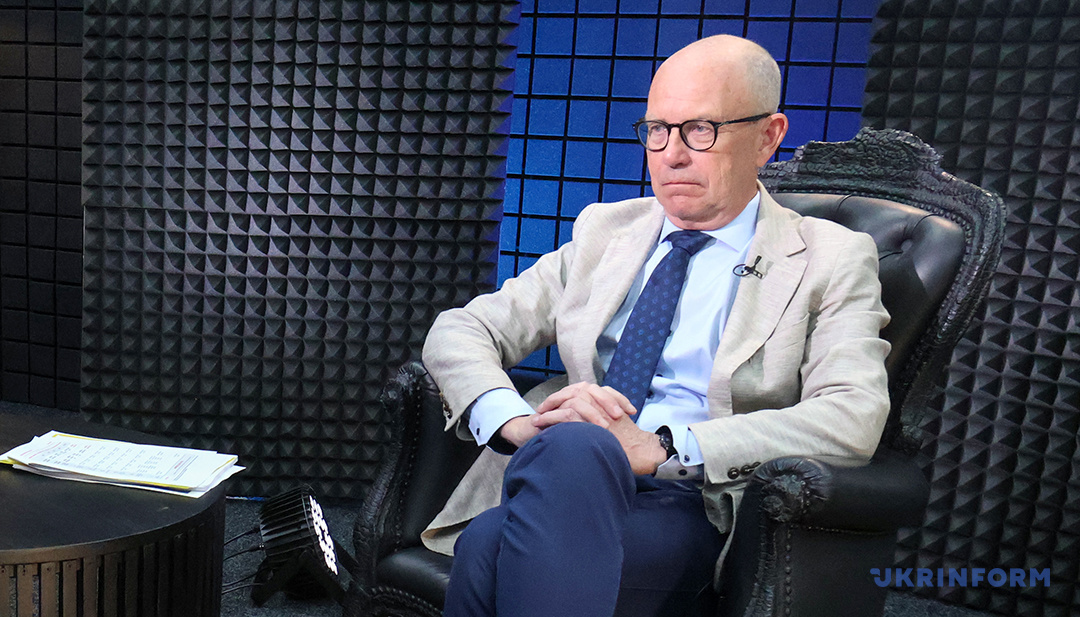
MYKOLAIV IS MY SECOND HOME
– You spoke of Mykolaiv region, and I can feel that you have a special attitude to it.
– My second home…
– I could understand that. Can you share some human stories that inspired you? You said, Denmark’s support is about weapons, weapons, and weapons. But we also see that it’s also about restoration and recovery, especially in this region. Could you share any stories that touched you the most?
– What has touched me most was on one of my first visits there, back in in 2022, when there was no water supply. There was no drinking water in the city. So, what Denmark did in close cooperation with local authorities was to establish emergency water stations so people could come with the water bottles and get water. Any major city, or any city, cannot function, people cannot live there if there’s no drinking water. And this was fixed. As I was at one of those water stations, some babushka, who lived in that area, came up to me. She gave me a big hug, and I could really feel that she was happy. And she said, “We’re so happy that the Danes helped.” And she might have never heard about Denmark before, she just knew it was some Northern country, but she was so grateful that Denmark has made this possible because she could not have stayed there if there was no drinking water, so that really warmed my heart because I could feel that this also has a human side. Of course, I work here as a Danish envoy but I’m also a human being. So I can feel that Ukrainians are immensely grateful, especially in Mykolaiv, which has been been going through a very difficult time. Whenever I go there, I can feel this spirit, and that makes me happy and convinced that I should work even harder for Ukraine, and for Danish-Ukrainian relations.
UKRAINE INSPIRES DANES WITH ITS RESILIENCE AND WILL TO RESIST
– Europe has enjoyed the privilege of peace, including due to the European Union establishment and security structures. Still, we’re saying that the security architecture is being reshaped. New challenges are arising, and what I wanted to ask you is about conscription for women in Denmark. I understand this part of the ongoing reform of the armed forces, but can you tell us more about these transformations?
– There is basically a fundamental change in Denmark in the sense that we are now re-arming big time, and I think previously not many Danes saw the need to do that, but I think this is what Russian aggression against Ukraine has demonstrated not only to Danes, but to Europeans in general, that we need to rearm. And this is what is happening now.
Massive procurement programs are being implemented. Our prime minister said recently to buy more weapons, so she basically underlined the need for defense procurement to rearm the Danish armed forces, but also in in terms of personnel there are needs. And as you rightly pointed out, one of the avenues will be female conscription, and in the Danish population there’s strong willingness to defend our country, should the need arise. And again, I think that Ukraine has also inspired us in terms of resilience and in terms of the will to fight back. It has inspired not only Danes but Europeans in general. You showed that it is possible to fight back, stand your ground, and do as Ukrainians have have been doing for so long. So this is also a source of inspiration for Danes and something that encouraged them to defend our own country.
– It’s amazing to hear that public feedback to this initiative was good. Just a little follow-up on the public opinions in Denmark. Is it now on the table in the public discourse that Russia can pose potentially a direct military threat to Denmark?
– I think most Danes would think that what is happening here could also happen elsewhere. I think that is not only the case in Denmark but in European public opinion. We are only two hours from Denmark by plane. This is a European capital. This morning, I went to see this location in the Solomiansky district where a five-storey apartment building had been leveled to the ground, and this is in a European capital just two hours from Denmark. This is not something very distant. This is not something very far away. Danes can see when they turn on the television that this is happening in Europe. This is happening close to our own borders, and I think that has instilled a strong sense of urgency in many Danes in terms of making sure that we can defend ourselves, that we can do what we can in terms of security, in terms of defense. So this had a profound impact not only on Danish public opinion, but on European public opinion in general.
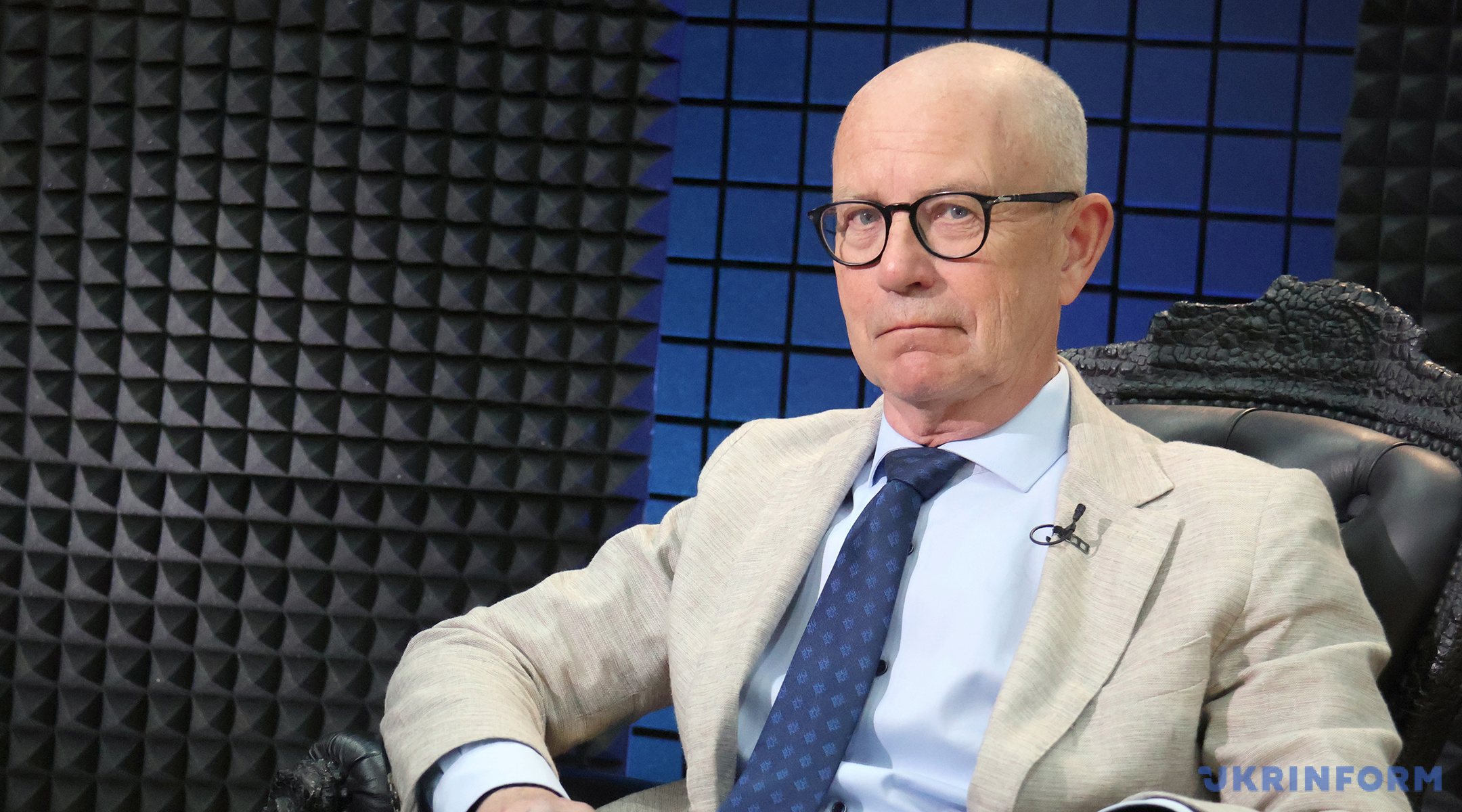
DANISH BUSINESSES BELIEVE IN UKRAINE
– Coming back to recovery and investment, last fall, Denmark has established with Ukrainian authorities a fast track system that would streamline the investment to help Danish companies to establish in Ukraine. How are things going along this line? Is it the case that the investment became more streamlined since then?
– I think that, in general, the Danish companies operating here are happy. Some of them have even expanded their operations during the full-scale invasion. In 2023, one of the biggest foreign investments in Ukraine was actually a Danish Carlsberg Group investing in a new production line here in Kyiv. That’s a sign that the Danish business community has belief in Ukraine It is already an interesting market and after the victory, it will become even more interesting, of course. T
here are challenges operating in a country at war. Again, what I saw this morning shows that even in Kyiv and even in Western Ukraine, you cannot be safe, but still, the economy is functioning, and production and manufacturing is functioning. So by and large, the Danish companies are happy, even though they have issues but they are fixing them with the Ukrainian authorities or with us, and we try to sort things out.
DENMARK HELPS UKRAINE ADAPT LEGISLATION TO EU LAW
– Perhaps a little technical question on the issue of economic cooperation. Denmark and Ukraine have agreed on the plan of pharmaceutical regulation until 2028. What is the importance of this particular issue?
It’s a good example of how we can work together on technical adaptation to Ukraine’s future membership of the European Union, because in so many areas, Ukraine will have to adapt to the EU legislation, to the EU procedures, and for instance in the field of pharmaceuticals. There’s a huge body of EU regulation, and once Ukraine is in, or even before, you will have to adapt to that. So, this is an example of how we can assist Ukraine in that process of adaptation, and this is not only in in the field of pharmaceuticals.
It’s also in energy, environment, in so many fields, where we need to work together. Denmark has teamed up with our friends from Lithuania because they had gone through this process of adaptation before they joined the European Union in 2004. Back in those days, we were assisting our Baltic friends, in particular, in getting ready for EU membership. And now, the Lithuanians, the Next Generation, are assisting Ukraine. This process, a so-called pre-accession program, makes it possible to work together in very technical fields on how to get Ukraine ready for EU membership.
UKRAINE SHOULD STRIVE TOWARD FULFILLING COPENHAGEN CRITERIA
– Speaking of future membership, on July 1, your country is assuming presidency of the Council of the EU. What will be the main priorities of Denmark, including in the context of Ukraine and its European integration plans?
– European security, Ukraine, and the Green agenda. Those are the three main headlines for our presidency, and I can tell you that the Danish presidency of the Council will work as hard as we can in order to further Ukraine’s EU accession process. This has been stated very clearly by our minister for European affairs, who has been here on a number of occasions. She said she would invest her energy in making progress for Ukraine. We all know things in the Council are not so easy at the moment, but in that situation, the most important thing Ukraine can do is to continue the process of reform, adapting, and adopting things that are necessary for for EU membership, because the more progress you make, the better it will have an impact on European public opinion and on European decision makers.
So, even though the process as such might be difficult at the moment in the Council, this should not lead to Ukraine leaning back. On the contrary, you need to even work harder on adopting and adapting to the EU legislation, because once the challenges in the Council have been been tackled, then you are ready to catch up, so I think this is probably the most important thing in this situation.
In general, Danes are very supportive of Ukraine’s EU membership. If you look at opinion polls across Europe, more than 70 percent of Danes are in favor of Ukraine’s EU accession and Danes were proud that our capital gave the name to the criteria that are still the benchmark for any candidate country wishing to join the European Union. The Copenhagen criteria were adopted in our capital back in 1993. So this is what Ukraine should strive strive for in this situation, to live up to the Copehnagen criteria.
Danes are not worried about Ukraine’s EU membership. I remember back when there was a big EU enlargement, in 2002, the European Council met in Copenhagen and decided that in 2004, the Baltic States and Poland, the Czech Republic, Cyprus, and Slovakia, would join. Then there were voices saying that’s going to be very difficult for farmers, truck drivers, etc, but I see no such worries today because there are many Ukrainians living in Denmark, about 35,000 at the moment, and they are hard working people. They have adapted to life in Denmark. So Ukraine is welcome as a member of the European Union I think will be the answer most Danes will tell you were to ask them.
UKRAINE’S ACCESSION TO THE EU IS A GREAT OPPORTUNITY FOR EUROPE, INCLUDING IN TERMS OF SECURITY
– Some say that Ukraine is an answer if we’re talking about EU enlargement and some say it’s a question. So, do you tend to believe Ukraine is an answer?
– I think I speak on behalf of many Danes when I’m saying that I see this as a big opportunity for Europe and for European security to have Ukraine as a member, because you are a strong nation, you have been fighting on the battlefield for three years now, and you have stood your ground.
In that security context, it would definitely be to our advantage to have Ukraine as a fellow EU member, but also looking back to the last EU enlargement that happened in 2004, the Baltic States and Poland, our neighbors, became our EU partners – and look at the economic development in those countries. Before I came here as Denmark’s Ambassador, I served in Poland, and I’ve seen the Polish economic miracle with my own eyes. I’ve seen how Poland has developed tremendously from the 1990s until today, and I see no reason why Ukraine should not go through the same development once you become a member of the European Union, and this is a big advantage for Danes as well that you become a prosperous EU member just like Poland, just like the Baltic States.
So I see only opportunities, and of course there will be bumps on the road. We saw that back when there was the latest EU enlargement, but the European Union has proven to be very good at overcoming the challenges and convert them into opportunities. I am absolutely convinced that this would be the case with Ukraine’s EU membership.
Ievgen Matiushenko, Kyiv
Photo: Pavlo Bahmut

